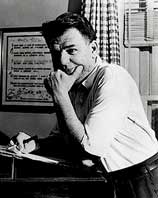This is a guest blog from former Oakland Tribune Theater Critic Robert Taylor:
Show Boat may have been a turning point in the American musical theater, and in the careers of composer Jerome Kern and lyricist Oscar Hammerstein II, but it was not the only show they created.
 Kern worked with many, lyricists during his 40-year stage and screen career, among them Dorothy Fields, Ira Gershwin and Johnny Mercer. So the partnership Kern and Hammerstein doesn’t pop up in the memory as easily as Rodgers and Hammerstein, Lerner and Loewe, or Kander and Ebb.
Kern worked with many, lyricists during his 40-year stage and screen career, among them Dorothy Fields, Ira Gershwin and Johnny Mercer. So the partnership Kern and Hammerstein doesn’t pop up in the memory as easily as Rodgers and Hammerstein, Lerner and Loewe, or Kander and Ebb. In fact, Hammerstein and Kern created seven musicals—just two fewer than Hammerstein wrote with Richard Rodgers. But only five of those reached New York, and only four were hits. Still, even the nearly forgotten Sweet Adeline was one of the hottest tickets on Broadway before the 1929 stock market crash. And Very Warm for May, which ran for only 59 performances in 1939, introduced “All the Things You Are.” Even rival Broadway composers have described "All the Things You Are" as the greatest song ever written.
In fact, Hammerstein and Kern created seven musicals—just two fewer than Hammerstein wrote with Richard Rodgers. But only five of those reached New York, and only four were hits. Still, even the nearly forgotten Sweet Adeline was one of the hottest tickets on Broadway before the 1929 stock market crash. And Very Warm for May, which ran for only 59 performances in 1939, introduced “All the Things You Are.” Even rival Broadway composers have described "All the Things You Are" as the greatest song ever written.Kern had a 15-year head start in the theater when he paired with Hammerstein (and Otto Harbach) for their first show, Sunny, in 1925. It was a vehicle for dancing star Marilyn Miller (following her Sally of 1920), but it brought out the best in the new partners. “They worked together as if born for this collaboration,” notes Hammerstein’s biographer Hugh Fordin. The show’s long-lasting hit song was “Who?”
Kern was immediately attracted to Edna Ferber’s best-selling novel Show Boat for their next collaboration in 1927, and Hammerstein needed no persuading. Theater historian Gerald Bordman still considers the landmark show the high point in Kern and Hammerstein’s careers, yet some of the critics left their names out of their reviews, lauding the show’s arrival as a Florenz Ziegfeld production.
Another theater historian, William Zinsser, claims that after Show Boat, Kern “went right back to composing Viennese-style musicals.” But his melodies continued to soar. Sweet Adeline, his third show with Hammerstein, re-created the Gay ’90s with “Spring is Here” and Helen Morgan introducing “Why Was I Born?”
Kern and Hammerstein’s Music in the Air, in 1932, was an operetta at first glance, set in Bavaria, but some critics considered it as revolutionary as Show Boat for merging book and score. “The Song is You” and “I’ve told Every Little Star”—a tune based on a birdcall Kern heard in Nantucket—became standards.
The hit songs, the standards, kept coming, but that was the end of the hit shows for the partnership as Kern settled comfortably in Beverly Hills to write for Hollywood musicals.
Kern’s cross-country shuttle was interrupted by their collaboration on Three Sisters, which ran 72 performances in London (introducing “I Won’t Dance,” which became a hit after it was used in the film Roberta.) Their Gentlemen Unafraid, set at West Point during the Civil War, got a tryout at the St. Louis Municipal Opera in 1938 but got no farther. One song, “Your Dream,” ended up in the movie One Night in the Tropics, a 1940 Abbott and Costello vehicle.
Very Warm for May got them back on Broadway in 1939, if briefly. The musical’s problems have generally been blamed on producer Max Gordon and director Vincente Minnelli, who urged Hammerstein to strip down a book that had won applause in its out-of-town tryout. At least the cast was intact—among them Eve Arden, Avon Long, and in smaller roles, June Allyson and Vera Ellen.
Although a review’s headline called Very Warm for May “not so hot for November,” the final Kern-Hammerstein collaboration lives on. It was revived in New York by Equity Library Theater in 1985 and in a concert performance in 1994, as well as by 42nd Street Moon in 1995.
Who wouldn’t want to hear that Jerome Kern score again, if only for “All the Things You Are”? It’s one of his and Hammerstein’s most indelible songs, yet Kern didn’t think it would be a hit because it was so complicated melodically.
It’s the most perfectly constructed of all popular standards, says William Zinsser in Easy to Remember: The Great American Songwriters and Their Songs. “Kern effortlessly moves through five keys in 32 bars without breaking a sweat.”
“All the Things You Are” has no end of champions, including singer and pianist Max Morath, who calls it “a superb standard” but challenging “with a 12-note range likely to mortify most singers.” And it was composer Arthur Schwartz who called it “the greatest song ever written.”
Thank you again to Robert Taylor for this guest blog. For your chance to hear Jerome Kern's original vocal arrangement of "All the Things You Are," come see Very Warm for May at the Eureka Theater running May 5-23. For tickets call (415) 255-8207 or buy online.



No comments:
Post a Comment